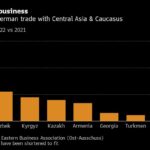
(Bloomberg) — Germany is taking over Russian oil major Rosneft PJSC’s German unit, including stakes in three oil refineries, as Chancellor Olaf Scholz’s government reacts to the unprecedented energy crisis sparked by the invasion of Ukraine.
Most Read from Bloomberg
Germany is set to stop importing the Russian crude that feeds its refineries later this year as part of Europe’s move to isolate Russia economically. The government’s move “counteracts the impending threat to the security of energy supply and lays an important foundation for the preservation and future of the Schwedt location,” the economy ministry said.
It’s an escalation in the economic standoff with Russia and marks another step in Berlin’s increasingly active role in the energy industry as it unwinds decades of tight collaboration with Russia.
Surging gas prices and Moscow’s move to squeeze supplies to Europe have already prompted a series of government bailouts and rescue loans for energy firms. Now, Scholz’s administration is in advanced talks to take over Uniper SE and two other large gas importers as it tries to avoid a collapse of its energy market, according to people familiar with the matter.
Germany has been hit especially hard by the energy standoff with Russia — both on oil and gas. The government said on Friday that grid regulator BNetzA will become trustee of RN Refining & Marketing GmbH and Rosneft Deutschland GmbH, which account for around 12% of Germany’s oil processing capacity, and stakes in oil refineries in Schwedt, Karlsruhe and Vohburg. It’s a similar setup to the takeover of Gazprom Germania earlier this year.
The Schwedt refinery — near the Polish border — has, until now, got its crude via the Druzhba pipeline from Russia. While the plant remained significantly in Russian hands, it was hard to see how the facility would keep getting enough fuels to supply Berlin and other parts of eastern Germany.
The refinery will probably have to lean heavily on Poland, from where it can get seaborne cargoes from the international marketplace. US cargoes are one possible source of replacement crude.
“The decision is accompanied by a comprehensive package for the future, which will provide a transformational boost for the region and support the refinery to ensure the supply of oil via alternative supply routes,” the ministry said, adding that insurers and banks were unwilling to do business with the companies anymore.
Scholz and Economy Minister Robert Habeck will present more details on the nationalization plan at a news conference in Berlin later Friday, it added.
(Updates with details)
Most Read from Bloomberg Businessweek
©2022 Bloomberg L.P.




